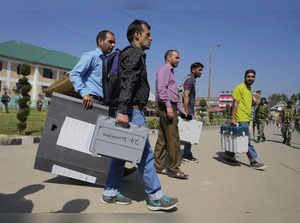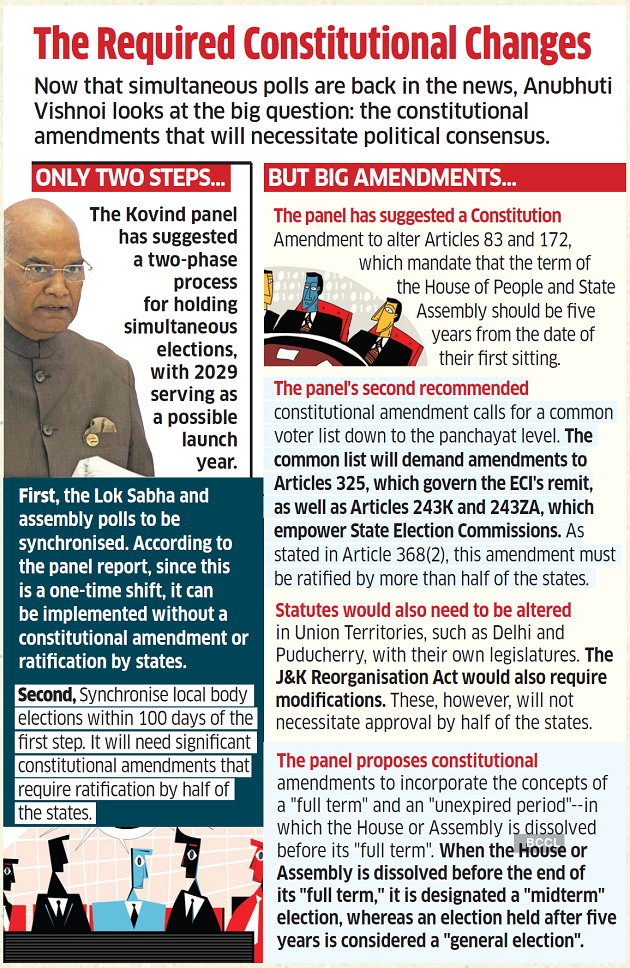Synopsis
The Union Cabinet has accepted recommendations from a high-level panel led by former President Ram Nath Kovind for holding simultaneous elections for Lok Sabha, state assemblies, and local bodies. This policy aims to streamline the electoral process. Three bills, including two constitutional amendments, will be required for implementation. An implementation group will be formed to discuss the recommendations further.
 AP
APIn a signifcant step towards the implementation of ‘One nation, One election’, the Union Cabinet on Wednesday accepted former President Ram Nath Kovind-led high-level panel’s recommendations for holding simultaneous polls for Lok Sabha, state assemblies and local bodies in a phased manner.
Sources said that during the Union Cabinet meeting, PM Narendra Modi briefed the ministers about the necessity and benefits of this landmark policy initiative.
In its report submitted to the government in March this year, the committee had recommended simultaneous polls for the Lok Sabha and state assemblies as the first step followed by synchronised local body polls within 100 days.
For implementation of this report, sources said three bills would be required, two of which would be constitutional amendments. One will be dealing with simultaneous elections of Lok Sabha and assemblies, second one to synchronise local polls so that it can be held within 100 days to the Lok Sabha and assemblies.
Both the bills seeking to amend constitution, required to be passed by two-third of majority in both Houses of Parliament. The second bill would also require ratification by not less than one-half of the states.
There would be a third legislation also, a consequential one dealing with issues of GNCTD Act and other similar acts.

Realising that the bills require a lot of political manoeuvring, the government has assigned three Union ministers to approach the Opposition parties to build consensus on the issue.
Announcing the cabinet’s approval to the proposal, Union minister Ashwini Vaishnaw said that an implementation group would be formed to take forward the recommendations of the panel and detailed discussions would be held on various fora across the country over the next few months.
When asked whether a bill would be brought in the upcoming winter session of Parliament, Vaishnaw evaded a direct reply but pointed out that Union home minister Amit Shah has said the government would implement it in its current tenure.

The report has also recommended a common electoral roll, which would need coordination between the Election Commission of India (ECI) and state election commissions.
The country had simultaneous elections between 1951 and 1967 but thereafter, polls started getting dispersed due to various reasons, including midterm elections.
The assembly election process for Jammu and Kashmir and Haryana is currently underway, while Maharashtra and Jharkhand are also scheduled to go to polls later this year.
Delhi and Bihar are among the states that are scheduled to go to polls in 2025.

The terms of the current assemblies in Assam, Kerala, Tamil Nadu, West Bengal, and Puducherry will end in 2026, while the terms of the Goa, Gujarat, Manipur, Punjab, Uttar Pradesh and Uttarakhand assemblies will end in 2027.
The terms of the state assemblies in Himachal Pradesh, Meghalaya, Nagaland, Tripura and Telangana will end in 2028.
The terms of the current Lok Sabha and the state assemblies — Odisha, Andhra Pradesh, Arunachal Pradesh and Sikkim that went to polls together with this year will end in 2029.

